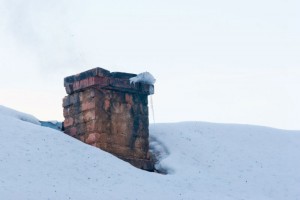Masonry chimneys are often viewed as elegant, robust structures that can stand the test of time. After all, chimneys used to only be constructed with masonry materials and many aged chimneys still exist today, even functioning to vent smoke from fireplaces. However, chimneys are not indestructible. In fact, masonry chimneys have a few weak spots, especially during the winter time.
Chimneys built in the masonry style consist of materials like brick, mortar, concrete, and stone. Aside from stone, all of these materials have a very porous nature, meaning they absorb water in a matter similar to a sponge. While not soft and pliable like a typical kitchen sponge, brick, mortar and concrete do have the ability to hold quite a bit of water. The process of absorbing water occurs throughout the year and does relatively little harm to the chimney during the warmer seasons. Once temperatures fall below freezing, though, the problems begin. In the winter, water undergoes a freeze and thaw cycle in which it continuously freezes, melts and freezes again. Water expands upon freezing and contracts upon melting, so the masonry materials containing any moisture have no choice but to expand and contract, as well. Unfortunately, this regular heaving throughout the winter degrades the strength of the materials. Signs of this type of water damage start off as cracks in the mortar or even missing mortar. The damage can progress to cracked and loose bricks, and sometimes the chimney can even collapse. Fortunately, most of these issues can be repaired by a chimney specialist, and the water damage issue can be prevented by the application of a special masonry permeable sealer.
Water can also can other problems in the chimney, particularly during the winter. With the warmth from the fire flowing out the chimney, any snow or ice at the top of the chimney becomes water leaking inside. The first point of damage is the flue liner. If the liner is made of steel, the water with rust cracks and holes into it, which exposes the house to the heat of the fire and to the toxic fumes meant to escape through the chimney. In addition, the water can settle onto the damper – rusting it out and causing it to work improperly. Water damage can also enter the home itself, which is made evident by a crumbling hearth and water stains on the walls and ceilings surrounding the fireplace. These issues can all be prevented by having a chimney specialist install a chimney cap at the top of the chimney and properly maintain the chimney crown, if one is present.
Chimneys do put up with a lot in terms of weather, but they cannot defy everything on their own. With a little attention from a chimney expert, though, your chimney can handle winters for many more years to come. To schedule an inspection of your chimney in the Elkton, Maryland area, contact the professionals at Ace Chimney Sweeps.

